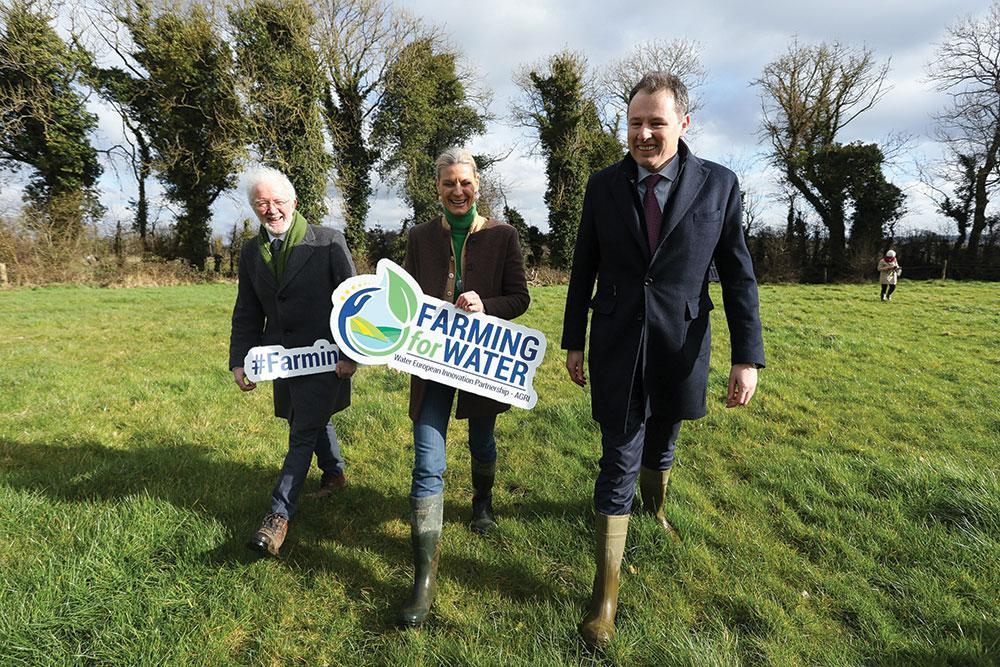21 August 2024
Measuring up
Locally led water stewardship is following catchment science principles and focusing on water quality with multiple benefits.

Ministers Malcolm Noonan (left), Pippa Hackett and Charlie McConalogue at Lough Ennel for the launch of the Farming for Water EIP. Photo credit: Water EIP
Water quality supports the variety and quality of life in Ireland. Our international reputation as a producer of sustainable food depends on an abundance of clean water. However, there are many challenges to protecting water quality. Ireland’s River Basin Management Plan provides the roadmap to achieve this. Approximately half of our estimated 4,810 waterbodies don’t meet required objectives, and the agriculture sector exerts significant pressure on national waterbodies. Potential solutions require an understanding of the sector and its issues, and the development of measures that are fit for purpose.
Farming for Water (EIP) is a €60 million European Innovation Partnership project, running until the end of 2027. It aims to support farmers in placing “the right measures in the right place” by taking a targeted approach to managing risk to water quality from their farms. It is guided by the learnings of Teagasc’s Agricultural Sustainability Support and Advisory Programme. Key among these learnings is the need to provide financial support for farmers to implement recommended measures.
The project follows catchment science principles but puts farmers at the forefront of co-design and implementation of measures. Taking a multi-benefit approach, it focuses on water quality alongside biodiversity and climate issues. The project is a partnership led by the Local Authority Waters Programme, Teagasc and Dairy Industry Ireland and was established in response to the sixth competitive call by the Department of Agriculture, Food, and the Marine for proposals under the EIP initiative.
This call specifically focused on reducing losses of phosphorus, nitrogen, sediment and pesticides to water from agricultural lands. To do so, principles of integrated catchment science are followed, promoting the adoption of innovative best practice in nutrient management, the application of nature-based natural water retention measures and other suitable measures at farm level.
Farmer-first philosophy
The project aims to involve up to 15,000 farmers across Ireland; entry to the scheme will be prioritised to areas identified under the River Basin Management Plan as ‘Priority Areas for Action’. There are over 40 measures applicable, addressing risk from phosphorous, sediment and pesticides. Nitrogen surplus use is addressed, providing support to farmers to increase their nitrogen use efficiency and reduce loss to water.
A key philosophy is to examine issues from a farmer’s perspective, applying catchment science and practical advisory knowledge to develop solutions that work for a particular farm. The development of a rainwater management plan will assist in working out where best to place the measures. Crucially, nature-based approaches will also help make farms more climate-resilient.
The project’s vision is to support and facilitate the application of locally-led water stewardship, following catchment science principles and focusing on water quality, climate and biodiversity. This will be done through championing project actions, integrating project learnings into sustainability initiatives and ensuring that the work programme is supported at every stage in the delivery process.
A Farming for Water EIP research hub has also been established, to facilitate the participation of research institutes across Ireland, to address research questions and to support project validation.
Words by: Fran Igoe, Regional Coordinator at the Local Authority Waters Programme
Find out more about the Local Authority Waters Programme at this link: lawaters.ie
